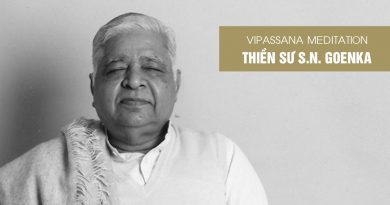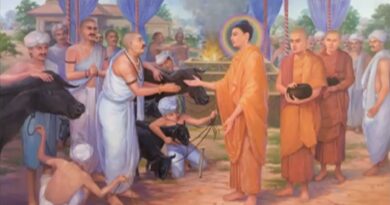Interview Of Mr. Goenka On Jimmy Young Programme
As part of his tour of Europe and North America in 2002, Goenkaji was interviewed live on BBC national radio. He appeared as a guest on the popular “Jimmy Young Programme,” with an audience of 5.5 million listeners in Britain and abroad. Following is an edited transcript of the interview and public response.
JY: I’m going to be talking shortly to a millionaire businessman who some time ago turned his back on the material world and has become a widely known teacher of the practice of meditation.
JY: Now I mentioned meditation just now and I suppose that for many people that conjures up images of time spent with legs crossed waiting for spiritual enlightenment. But a particular branch of the practice has proved so successful that its followed by hundreds of thousands of people around the world and in fact is being used in India to help rehabilitate murderers, rapists and indeed terrorists as well. And the rise of what is called Vipassana meditation owes much to one man whose name is Mr. S.N. Goenka and who I’m happy to say is in the studio with me now. Good afternoon, Mr. Goenka.
SNG: Pleased to be here, Jim.
JY: I gather that looking back you were once upon a time a millionaire running a very, very successful business. What then made you decide to take up meditation?
SNG: Well, I got so much benefit from this technique. I was a very ego-centred person, although very rich, but very ego-centred, very short-tempered, and I used to have very strong migraine headaches. No painkiller would work. The doctors started giving me morphine injections and then they were worried that I might become a morphine addict. As a result of taking this course, the migraine went away, the need for morphine went away and my short-tempered nature went away.
JY: Why this particular strand of meditation-I hope I’ve got the name right -Vipassana? What does Vipassana actually mean and what is so special about it?
SNG: It is observation, observation of the truth within oneself. The reality as it is, pertaining to the interaction of mind and matter.
JY: When you’re doing this, I was going to say meditating, let us say when you’re doing this observing, what do you actually do?
SNG: You see, we start observing the breath first, because breath is strongly related to the mind and body both. And then we switch over to bodily sensations which again are strongly related to body and also to the mind. And we start understanding the interaction of the two. How the body gets influenced by the mind and how mind gets influenced by the body; and because one does not know what is happening deep inside one starts generating some impurity or another, some negativity or another, which keeps on multiplying; and one gets overpowered by that and then one performs such actions which are unhealthy; and then one starts repenting. By this technique one realizes “This is harmful, harmful to me and harmful to others,” and the habit pattern starts changing.
JY: You started then teaching this yourself, and you set up the Vipassana Trust in 1969, is that correct?
SNG: Quite so.
JY: And you have 100,000 students learning this technique every year?
SNG: Yes, last year there were 100,000 students. Every year its increasing.
JY: And those students, are they just in India or all over the world?
SNG: Round the world, and they come from every religion, from every background, from every country. There is no religion in the world whose followers are not attending Vipassana.
JY: And its being taught as I mentioned in Indian prisons at the moment. Now why did the Indian government seize on that and want it to be taught to offenders?
SNG: Because a great saint of India by the name of Vinoba Bhave challenged me, saying, “If Vipassana has any efficacy, give a trial with these hardened criminals. If they change then I will accept that, yes, this is a wonderful technique.” A course was arranged with hardened criminals in the jail, and within ten days a big change started coming. So two or three courses were set up, and the government found that this is something scientific and non-sectarian.
JY: What sort of changes did you, or the government, observe?
SNG: People who were full of anger, hatred-even in the jail they keep on thinking about taking revenge, saying to themselves, “When I go out I will kill so and so, I will take vengeance on so and so.” By Vipassana they start realizing that when anyone has this kind of negative thought there is a sensation in the body, a very unpleasant sensation. The body starts heating up-a lot of heat, perspiration, throbbing, pulsing and tension. They recognize, “Im a miserable person. What am I doing? Im harming myself.” When they start realizing this, the habit pattern begins changing.
JY: Now when they got out of prison, did they then keep following this practice?
SNG: Naturally, because they get so much benefit from it. A large number of them keep on following the practice morning and evening, and they live a very good life. Of course they find some difficulty because society is reluctant to accept them-the blot of a criminal past is there-but still our students are helping them and they are getting jobs in some industries and business. Sometimes they come and serve in the Vipassana centres.
JY: We’ve been talking about people in jail in India but I understand a course was held here in Lancaster Prison?
SNG: Yes and in America also, a number of courses in America. Now there will be another course of very hardened criminals there soon.
JY: Okay, there are all these people in jail-terrorists, religious fanatics, rapists and so on. How did you persuade them to take part?
SNG: I don’t persuade them. I just say, give a trial to this technique and just start observing. Following the technique, they start observing themselves. And as they observe they start realizing, “Look I’m so ignorant, ‘m harming myself. I want to harm others as a terrorist but actually first I harm myself and only then do I harm others.” When you generate any negativity in the mind, you are the first victim of your negativity.
JY: You don’t suppose, do you, that cynical people might think, “Ah, they saw that as a way of getting out of jail. I’m going to say this has reformed me and I’m going to be good, then they will release me.”
SNG: No, it is only because of their own experience they find, “Whatever I did was wrong. And whatever negative thought I have now is so harmful to me, I have to change my habit pattern.” Nobody wants to harm oneself. Ignorantly one keeps on generating negativity and keeps on harming oneself and becomes so miserable.
JY: You were a businessman yourself. We’ve talked quite a bit about prisoners; do you teach this to business executives also?
SNG: Certainly. A large number of CEOs in India have come to the courses. The government of Bombay is sending senior officials to take courses, and a big change is coming in their lives. Their capacity to work increases. The mind remains so tranquil and transparent; when any problem comes they give a quick decision, a right decision, and so their capacity increases.
JY: How do people find out about Vipassana, like people listening to us now-how do they find out more?
SNG: You see, those who get benefit from it, they cant resist, they start telling their friends and family, “It is so good, it has done me so much good, you also go and give a trial.” This is how it has spread.
JY: So its by word of mouth?
SNG: Word of mouth; we never have any kind of publicity or propaganda. Good that you are now announcing it, so people will know and a large number will come out of that.
JY: (laughing) Well, it will be very interesting to see what reaction we get on our telephones. We’ve got five and a half million people listening to you so it’ll be interesting to see what they have to say. Good to talk to you on the program today, thank you very much for coming in.
SNG: Thank you, Jim.
JY: That was Mr. S.N. Goenka and we were talking about Vipassana. If you want to give us your comments and I’ve no doubt you will, phone us.
Public Feedback
Joy Maynard, Ipswich: “I was absolutely fascinated by your Indian guest, Id like to hear more about what he teaches.”
Colin Jenkins, Pudsey: “So much of the news is dominated by violence. I was delighted to hear somebody preaching peace for a change. If it works on murderers and rapists and so on, perhaps it will work on politicians as well.”
Janey, London: “In these violent days, where the only answer to the problems of the world must be a re-emergence of spiritual values, I am very glad indeed that you at least are giving some air time to somebody with those views.”
Jim, Grays Inn: “Meditation, well its better than sitting around doing nothing, isn’t it?”
Mrs. Webb, Wakefield: “I was absolutely fascinated by your last guest. That interview should be sent to the Home Secretary and to the man in charge of our prisons.”
Norman Whiting, Carlisle: “I listen to the program every day and it always has surprises, always something new to learn about. Today your Indian teacher was fascinating.”
Chris Vass, Salisbury: “That interview was absolutely fascinating and very thought-provoking. If mankind concentrated more on its spirituality and its individual self-worth and less on its physical world, many of the world conflicts just wouldn’t exist.”
Joss Cleveland, Internet: “How wonderful if we could all do this. My husband had a terrible childhood, he now has a lot of anger and negativity churning through his system, and if only he could hear what that man is teaching people he would have a very much happier life. What a great deal of good that gentleman is doing.”
Shelina, Herefordshire: “I’ve been to a number of retreats similar to the one your guest was talking about earlier and they really changed my life. Courses are run all around the world and they are run for free.”
Paul Gillard, Basingstoke: “I felt that was a very timely interview, if I may say so, because the country needs to look inwards. This kind of work settles minds, it dampens a lot of violence. Give peace and meditation a chance.”
Claudine, Hampton: “I’ve done two of Mr. Goenka’s courses. They were the hardest things I’ve ever done but the effects were absolutely marvelous, they take you to places inside yourself where you’ve never been before. Meditation also helped me through a painful childbirth.”
Charles Sweeney, Internet: “When you asked for contact details, Mr. Goenka didn’t give any and that convinced me that he was genuine and he was not there to sell something.”
Paul, Herefordshire: “As a student of Mr. Goenka, I would like to point out that its not just the prison inmates who do Vipassana meditation, the warders do it as well.”
Natalie Green, Leytonstone: “I thought that interview with S.N. Goenka was great. I really appreciated hearing more about the spiritual side of life.”
Tom Craven, Glasgow: “They should teach that meditation in schools, it might have an effect on youth offenders or indeed prevent them becoming offenders.”
Noel, London: “I meditate and I think Vipassana is an excellent meditation technique with life-changing consequences. Thank you for a great interview, Jim.”
Anne Gerard, Internet: “I am greatly impressed and indeed warmed by the overwhelming positive response from your listeners to S.N. Goenka. I expected some comments rubbishing his approach as nonsense but its given me renewed faith in people in this country, to learn of so many open minds.”
Terry Oldham, Scunthorpe: “S.N. Goenkas amazing. I know someone who went on his courses and was totally freed from an addiction to alcohol. If his meditation was used in every prison and school and workplace, I think this country would be a changed place.”
William Hudson, Manchester: “My neighbour came round this morning for coffee and we both stopped chatting so we could listen to Mr. Goenka. I haven’t heard him anywhere else in the media, its another first for your program.”
Andrew Davies, St. Neotts: “S.N. Goenka could do with his own teaching course in the national media, to provide some light relief from all those horror stories about the breakdown of law and order.”
Alice Harper, Dundee: “I’m a sales manager. Using meditation techniques among my team improves sales by about fifty percent. Its a much neglected practice, no wonder so many business executives are doing it.”
Tim Worsley, Huddersfield: “It was obvious that your guest was genuine and not on the make; otherwise he’d have plugged his book, plugged his record and plugged his pay phone line. I for one would like to hear more about and from him.”
Mrs. Stephens, Newcastle: “I’m usually a bit of a cynic when it comes to spiritual things but this really did sound different and I hear its open to any religion or non-religion, so thank you for another informative interview.”
Jennifer, North Leeds: “The reaction of Radio 2 listeners to the Mr. Goenka interview proves the point that your program does appeal to a very wide cross-section of society.”
(Reproduced by kind permission of the BBC)
Source: https://www.vridhamma.org






